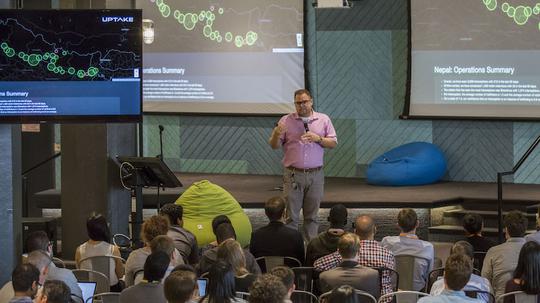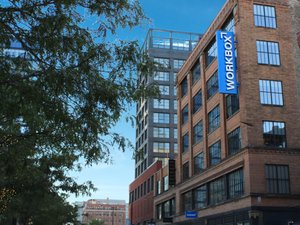
Chicago startup Uptake has helped large corporations like Caterpillar and Berkshire Hathaway better use predictive analytics and big data on its way to a $2 billion valuation in just a couple years. But the fast-growing startup isn't just working with the Fortune 500. It's also helping non-profits and other social good organizations use the same kind of technology to solve global problems.
About a year ago, Uptake launched beyond.uptake, the startup's philanthropic and civic innovation arm that puts predictive analytics into the hands of organizations that are ready to make a difference. Often, non-profits and social organizations don't have the resources to invest in data science, so Uptake works with those groups to develops new applications that can help make a difference, at no cost to the organizations.
So far, Uptake has launched a tool for first-generation college applicants that helps them apply to schools where they'll see the best chance of admission and graduation, and an application for anti-human trafficking organizations to help spot potential victims that are crossing the border.
Uptake also launched a data fellowship program that connects data professionals at non-profits and social enterprises to experts in data science. Its first cohort just wrapped up last week.
"We see this as a way to give back to the world, as a way to be generous ... and to combine our skills and technology to solve problems facing the world," said Andrew Means, head of beyond.uptake.
Uptake's product for students applying for college, called Student Union, helps low-income and first-generation college-bound students find the right school. Students enter their GPA and demographic information like race and ethnicity, and Uptake's algorithm gives them a list of schools that have the best chances of admission and graduation for a candidate like themselves.
The goal is to give more resources to first-generation college applicants, and help students apply to more rigorous schools based on their qualifications, Uptake says. Low-income and first-generation students will often choose a school based on location or where their friends go, Uptake explained, and often don't realize they're qualified for a better program.
Organizations like One Goal are currently using Uptake's Students Union app, and the goal is to have 100,000 students using it by the end of 2018, the company said.
"It's a tool that we’re hoping gives students the information they need to make a really informed and successful college decision in a really digestible way," Means said.
Uptake's second philanthropic product, Reroute, tackles a very different problem: human trafficking. Reroute is a border and transit monitoring tool that helps law enforcement agencies spot potential victims of human trafficking. The tool helps organizations recognize victim profiles as people cross the border, and Uptake is currently piloting the project with authorities on the Nepal and India border.
The goal with Reroute is to have between three to five organizations using the border monitoring application by the end of this year, Uptake said.
The data fellows program, currently the third piece of Uptake's civic program, is a six-month program that connects people at non-profits with Uptake's data science experts to improve data science efforts at their organization. The first cohort, which wrapped up last week, featured professionals from the City of Chicago, the CTA and education non-profit World Reader, who were able to implement data science initiatives at their places of work thanks to fundamentals and resources gained at Uptake.
"It's about taking what we do at Uptake for our large corporate clients and doing it for some really impactful organizations," Means said. "We started the fellowship program as a way to provide a nice professional development community for people who are leading data efforts inside their organization."
As Uptake, which has almost 800 employees, continues to grow and change the way old-school industries use predictive analytics, the company says it wants to have an increased focus on using its tech to tackle some of the world's biggest problems.
"We're giving [non-profits] the freedom to try new things, and new ways to use data science in their work," Means said.








